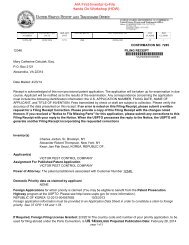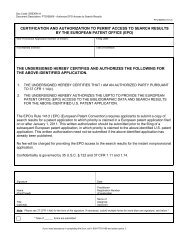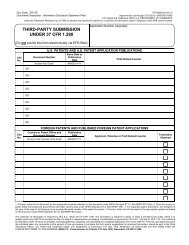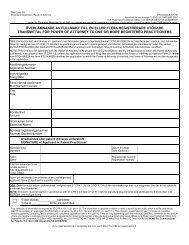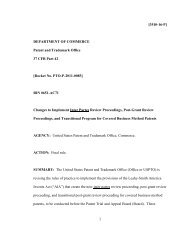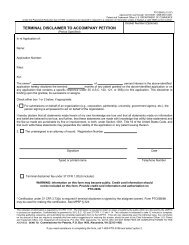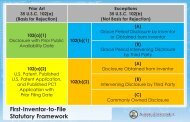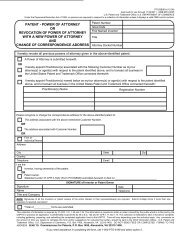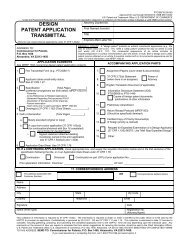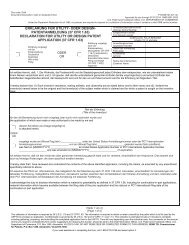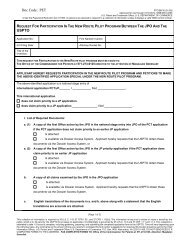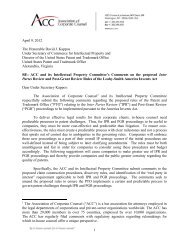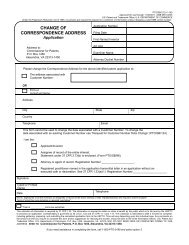USPTO Performance and Accountability Report - U.S. Patent and ...
USPTO Performance and Accountability Report - U.S. Patent and ...
USPTO Performance and Accountability Report - U.S. Patent and ...
Create successful ePaper yourself
Turn your PDF publications into a flip-book with our unique Google optimized e-Paper software.
Providing Policy Advice <strong>and</strong> Expertise to<br />
Other USG Agencies<br />
The <strong>USPTO</strong> continued to provide policy advice <strong>and</strong><br />
technical expertise on IP administration, protection,<br />
<strong>and</strong> enforcement both domestically <strong>and</strong> internationally<br />
to the DOC <strong>and</strong> other federal agencies.<br />
The <strong>USPTO</strong> advised the Office of the United States<br />
Trade Representative during the WTO accession<br />
process of several countries in evaluating intellectual<br />
property rights (IPR) laws, regulations, <strong>and</strong><br />
practices of countries <strong>and</strong> their consistency with the<br />
Agreement on Trade-Related Aspects of Intellectual<br />
Property.<br />
The <strong>USPTO</strong> provides policy advice <strong>and</strong> expertise to<br />
the U.S. Department of State regarding IP issues that<br />
arise in various agencies of the United Nations<br />
including WIPO <strong>and</strong> the World Health Organization,<br />
as well as the Organization for Economic Cooperation<br />
<strong>and</strong> Development.<br />
Providing Technical Expertise in Negotiation<br />
<strong>and</strong> Implementation of Bilateral <strong>and</strong><br />
Multilateral Agreements<br />
In FY 2012, the <strong>USPTO</strong> continued to provide expert<br />
technical advice on IP protection in connection with<br />
on-going negotiations <strong>and</strong> implementation of<br />
bilateral <strong>and</strong> multilateral agreements. For example,<br />
the <strong>USPTO</strong> played an active role in the ongoing TPP<br />
free trade agreement negotiations which seek to<br />
ensure an effective <strong>and</strong> balanced approach to intellectual<br />
property rights among the member countries.<br />
The <strong>USPTO</strong> worked closely with USTR to assist Korea,<br />
Colombia, <strong>and</strong> Panama with implementation of the<br />
IP provisions of their free trade agreements with the<br />
United States. Among other things, these agreements<br />
provide for state-of-the-art protection for U.S.<br />
trademarks such as exp<strong>and</strong>ing the definition of a<br />
trademark to include protection for non-visually<br />
perceptible marks, as well as recognizing the principles<br />
of priority <strong>and</strong> exclusivity in the relationship<br />
between trademarks <strong>and</strong> geographical indications.<br />
Improved transparency provisions provide interested<br />
parties the opportunity to oppose <strong>and</strong> cancel registrations<br />
<strong>and</strong> to know the reason for decisions with<br />
respect to registration. Finally, the agreements<br />
memorialized each country’s commitment to<br />
improving its trademark system by implementing an<br />
electronic application filing system <strong>and</strong> developing<br />
MANAGEMENT’S DISCUSSION AND ANALYSIS<br />
Under Secretary of Commerce for Intellectual Property<br />
<strong>and</strong> Director of the <strong>USPTO</strong>, David Kappos <strong>and</strong><br />
President of EPO signing the Joint Cooperative <strong>Patent</strong><br />
Classification (CPC) statement in October 2010.<br />
a public on-line database of trademark applications<br />
<strong>and</strong> registrations. This will save U.S. companies time<br />
<strong>and</strong> money <strong>and</strong> make it easier for them to take the<br />
necessary steps to protect their trademarks in these<br />
markets.<br />
The <strong>USPTO</strong> continued to play an active role in the<br />
negotiation of Science <strong>and</strong> Technology Agreements<br />
with several countries.<br />
Increasing the effectiveness of IP Attachés<br />
in Prioritized Countries/Regions<br />
The <strong>USPTO</strong> places a high priority on increasing the effectiveness<br />
of the IP systems in prioritized countries/regions.<br />
In 2012, The IP Attaché program instituted new vision<br />
<strong>and</strong> mission statements that clearly linked program<br />
objectives <strong>and</strong> priorities to the overall mission of the<br />
<strong>USPTO</strong>. St<strong>and</strong>ard operating procedures, developed by<br />
the IP Attaché Task Force, were implemented.<br />
They require Attachés to: (1) consult with stakeholders<br />
to define <strong>and</strong> prioritize IP-related business objectives in<br />
their country <strong>and</strong> region; (2) build a matrix of U.S. <strong>and</strong><br />
foreign stakeholder associations <strong>and</strong> companies, <strong>and</strong><br />
their respective IP-related concerns; (3) identify any<br />
existing bilateral agreements that support our objectives;<br />
<strong>and</strong> (4) seek to negotiate bilateral agreements, or<br />
informal work plans, <strong>and</strong> associated metrics with host<br />
governments.<br />
www.uspto.gov<br />
43


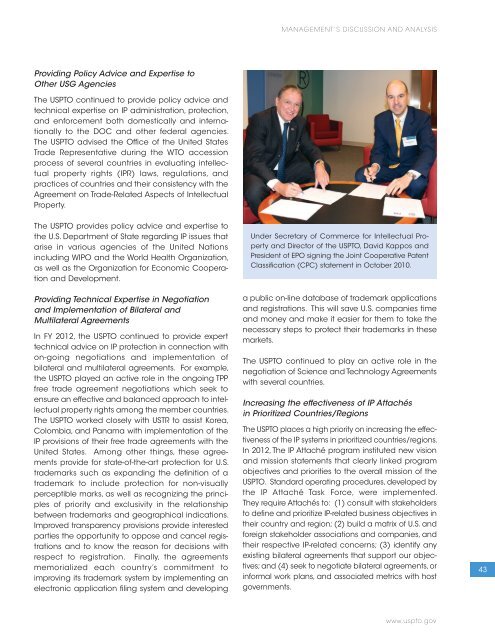
![Printable version [PDF] - United States Patent and Trademark Office](https://img.yumpu.com/51835259/1/184x260/printable-version-pdf-united-states-patent-and-trademark-office.jpg?quality=85)
